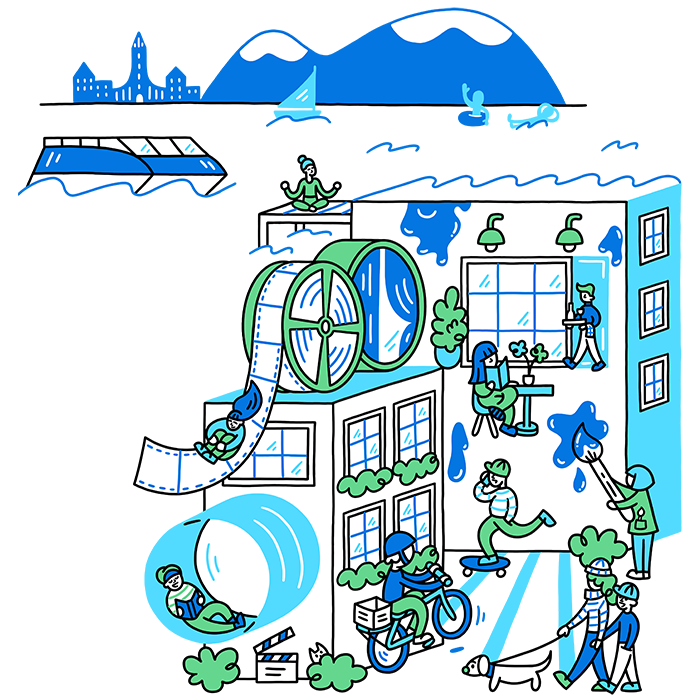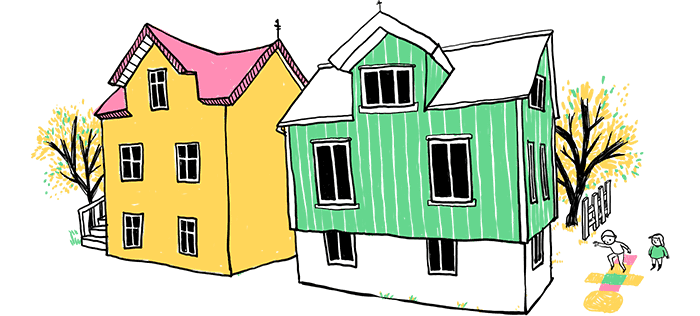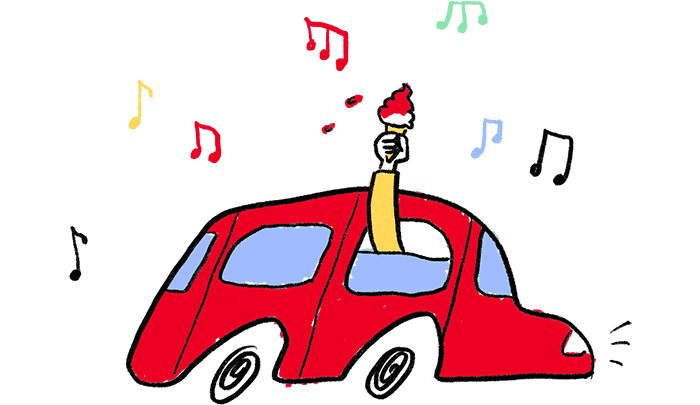Sewer system and pollution
Over the past two decades, significant improvements have been made to drainage issues in the capital area. Sewers are all structures built for the treatment, transport, or cleaning of wastewater (pipes, conduit systems, collector sewers, and equipment for wastewater treatment and cleaning).
Sewer system and pollution
Reykjavík's sewer system is dual in new neighborhoods built after 1965. The capital area's sewer system transports all wastewater from homes and businesses to treatment plants. Stormwater is managed differently. Stormwater is rain and meltwater that flows into the sewer from roofs, streets, parking lots, sidewalks, and other impervious surfaces. It goes into a separate stormwater system, bypasses treatment plants, and is discharged into the nearest recipient, which may be a stream, river, or coastal waters.
Reykjavík Public Health receives annual reports of pollution carried by stormwater to recipients in Reykjavík. Do not pour any substances such as paint, thinner, grease, or oil into drains. It's crucial that no substances that can harm the ecosystem or human health enter stormwater pipes. Toxic waste should be taken to recycling stations.

General information about the sewer system
Wastewater is used water, e.g., from baths, sinks, toilets, washing machines, and car washes. During use, various substances such as human waste, food scraps, oils, soaps, cleaning agents, metals, and even hazardous materials can mix with otherwise clean water. Each individual is responsible for not disposing of pollutants and waste in wastewater, as such disposal harms the environment and ecosystem and can damage the sewer system itself.
Wastewater treatment is necessary to reduce negative environmental impacts. Separate stormwater and wastewater pipes are required, allowing wastewater to be directed to different channels based on the level of treatment needed. Rainwater or stormwater from streets is generally not contaminated with microorganisms or substances, and often simple treatment is sufficient before release into the environment. Wastewater, however, contains large amounts of microorganisms harmful to human health and organic matter and waste that require special treatment.
Regulatory framework
A regulation on sewers and wastewater and the Act on the Development and Operation of Sewer Systems are in effect. The regulation is based on the European directive on urban wastewater treatment (No. 271/1991/EEC). Additionally, there is a regulation on septic tanks in Reykjavík No. 593/2001.
Veitur Utilities ohf. manages the operation and development of the sewer system in Reykjavík, and Reykjavík Public Health monitors the sewer system in accordance with the regulation on sewers and wastewater.
Property owners' responsibilities
Article 12 of the Act on the Development and Operation of Sewer Systems addresses sewer pipes and property owners' responsibilities:
-
Property owners where sewers are located must, at their own expense, handle the installation and maintenance of service pipes for drainage to connect to the sewer system. The pipes should connect to the sewer system at the location and elevation specified by the sewer authority.
-
Stormwater and wastewater should be separated in sewer pipes unless otherwise permitted.
-
If a sewer owner renovates their sewer system to separate stormwater and wastewater, property owners must simultaneously separate stormwater and wastewater when renewing service pipes or making major improvements.
-
Where two or more properties share a service pipe, the owners must jointly manage and fund the installation, operation, and maintenance of the service pipe unless otherwise agreed.
-
Property owners must maintain their property's sewer pipes and ensure they don't clog.
Therefore, homeowners are responsible for repairing and maintaining the drainage pipes from their properties
-
Act No. 9/2009 on the Development and Operation of Sewer Systems
Septic tanks and leach fields
Wastewater from every property in Reykjavík that cannot connect to the City's sewer system must be directed through a septic tank. Applications to build or renovate a septic tank should be sent to the Building Official in Reykjavík with detailed drawings showing the type and location. The official must seek approval from Reykjavík Public Health regarding the design, type, size, and location of the septic tank.
Wastewater, bathwater, and washing water from all indoor drains and the garage's outdoor drain should be directed into the septic tank. Drainage from heating systems should not be directed into the septic tank without approval from Reykjavík Public Health. Roof water and other surface water should not be directed into the septic tank.

Acute pollution
Acute pollution refers to a sudden event requiring immediate response. The Environment Agency oversees acute pollution of seas and coasts and general pollution incidents across the country. The organization of the response itself is divided based on the location of the pollution incident. The local fire chief manages on-site control for pollution incidents on land according to Act No. 75/2000 on Fire Protection.
- Report acute pollution on land to the fire department or police at 112
- Report acute pollution at sea to the Icelandic Coast Guard at 511 3333
Car Wash
Reykjavík Public Health advises residents that car washing with chemicals at home is not recommended. Dust contaminated with heavy metals, carcinogenic substances, and nanoparticles can be released into nature when washing cars. Using less soap and washing the car at a car wash with appropriate pollution control equipment rather than at home is encouraged. Excessive use of chemical products is undesirable from an environmental perspective, as the substances can be harmful if released into nature, and their production often has negative environmental impacts.
The rules are:
-
Wash the car at a car wash or washing area where wastewater is partially treated or where substances from cars are rinsed off and treated as toxic waste. Undesirable substances should go into the drainage there - not into the runoff at home on the driveway, which goes directly into stormwater without treatment.
-
Skip cleaning agents when possible or
-
Use eco-certified cleaning agents, wax, and other products for washing the car.
-
It's wise to look for eco-labeled detergents, e.g., Swan-labeled, and it would be beneficial for operators to see the advantage in running eco-certified car washes and washing areas.

Reykjavík Public Health
Inquiries and/or suggestions
- Email: heilbrigdiseftirlit@reykjavik.is
- Borgartún 12, 105 Reykjavík
- Phone 411 1111